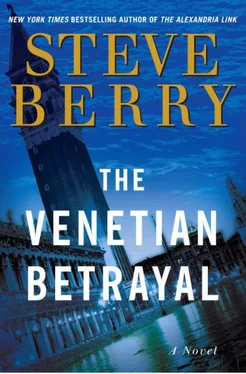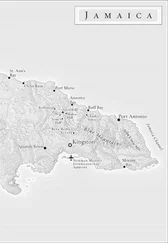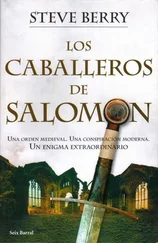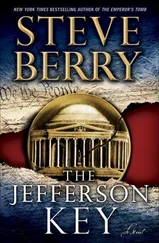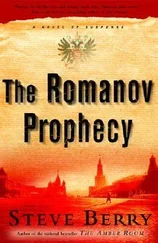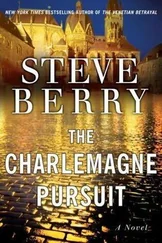“The court historian,” Cassiopeia said, “a man who also lost someone he loved when Alexander ordered Callisthenes executed four years previous, recorded that account. Callisthenes was Aristotle’s nephew. He served as court historian until spring 327 BCE. That’s when he got caught up in an assassination plot. By then, Alexander’s paranoia had amplified to dangerous levels. So he ordered Callisthenes’ death. Aristotle was said never to have forgiven Alexander.”
Malone nodded. “Some say Aristotle sent the poison that supposedly killed Alexander.”
Thorvaldsen scoffed at the comment. “The king wasn’t poisoned. That manuscript proves it. Alexander died of an infection. Probably malaria. He’d been trudging through swamps a few weeks prior. But it’s hard to say for sure. And this drink, the draught, had cured him before and it cured the assistant.”
“Did you catch those symptoms?” Cassiopeia asked. “Fever, neck swelling, mucus, fatigue, lesions. That sounds viral. Yet this liquid totally cured the assistant.”
He was not impressed. “You can’t place much credence in a two-thousand-plus-year-old manuscript. You have no idea if it’s authentic.”
“It is,” Cassiopeia said.
He waited for her to explain.
“My friend was an expert. The technique he used to find the writing is state of the art and doesn’t lend itself to forgeries. We’re talking about reading words at a molecular level.”
“Cotton,” Thorvaldsen said. “Alexander knew there’d be a battle for his body. He’s known to have said, in the days before he died, that his prominent friends would engage in vast funerary games once he was gone. A curious comment, but one we’re beginning to understand.”
He’d caught something else and wanted to know from Cassiopeia, “You said your friend at the museum was an expert? Past tense?”
“He’s dead.”
And now he knew the source of her pain. “You were close?”
Cassiopeia did not answer.
“You could have told me,” he said to her.
“No, I couldn’t.”
Her words stung.
“Suffice it to say,” Thorvaldsen said, “that all this intrigue involves locating Alexander’s body.”
“Good luck. It’s not been seen in fifteen hundred years.”
“That’s the catch,” Cassiopeia coldly replied. “We might know where it is, and the man coming here to kill us doesn’t.”
SAMARKAND
12:20 P.M.
ZOVASTINA WATCHED THE STUDENTS’ EAGER FACES AND ASKED the class, “How many of you have read Homer?”
Only a few hands raised.
“I was at university, just like you, when I first read his epic.”
She’d come to the People’s Center for Higher Learning for one of her many weekly appearances. She tried to schedule at least five. Opportunities for the press, and the people, to see and hear her. Once a poorly funded Russian institute, now the center was a respectable place of academic learning. She’d seen to that because the Greeks were right. An illiterate state leads to no state at all.
She read from the copy of the Iliad open before her.
“‘The skin of the coward changes color all the time, he can’t get a grip on himself, he can’t sit still, he squats and rocks, shifting his weight from foot to foot, his heart racing, pounding inside the fellow’s ribs, his teeth chattering. He dreads some grisly death. But the skin of a brave soldier never blanches. He’s all control. Tense but no great fear.’”
The students seemed to enjoy her recitation.
“Homer’s words from over twenty-eight hundred years ago. They still make perfect sense.”
Cameras and microphones pointed her way from the back of the classroom. Being here reminded her of twenty-eight years ago. Northern Kazakhstan. Another classroom.
And her teacher.
“It’s okay to cry,” Sergej said to her.
The words had moved her. More so than she’d thought possible. She stared at the Ukrainian, who possessed a unique appreciation for the world.
“You’re but nineteen,” he said. “I remember when I first read Homer. It affected me, too.”
“Achilles is such a tortured soul.”
“We’re all tortured souls, Irina.”
She liked when he said her name. This man knew things she didn’t. He understood things she’d yet to experience. She wanted to know those things. “I never knew my mother and father. I never knew any of my family.”
“They’re not important.”
She was surprised. “How can you say that?”
He pointed to the book. “The lot of man is to suffer and die. What’s gone is of no consequence.”
For years she’d wondered why she seemed doomed to a life of loneliness. Friends were few, relationships nonexistent, life for her an endless challenge of wanting and lacking. Like Achilles.
“Irina, you’ll come to know the joy of the challenge. Life is one challenge after another. One battle after another. Always, like Achilles, in pursuit of excellence.”
“And what of failure?”
He shrugged. “The consequence of not succeeding. Remember what Homer said. Circumstances rule men, not men circumstances.”
She thought of another line from the poem. “What chilling blows we suffer-thanks to our own conflicting wills-whenever we show these mortal men some kindness.”
Her teacher nodded. “Never forget that.”
“Such a story,” she said to the class. “The Iliad. A war that raged for nine long years. Then, in its tenth, a quarrel led Achilles to stop fighting. A Greek hero, full of pride, a fighter whose humanity stemmed from great passion, invulnerable except for his heels.”
She saw smiles on some faces.
“Everyone has a weakness,” she said.
“What’s yours, Minister?” one of the students asked.
She’d told them not to be bashful.
Questions were good.
“Why do you teach me these things?” she asked Sergej.
“To know your heritage is to understand it. Do you realize that you may well be a descendant of the Greeks?”
She gave him a perplexed look. “How is that possible?”
“Long ago, before Islam, when Alexander and the Greeks claimed this land, many of his men stayed after he returned home. They settled our valleys and took local women as wives. Some of our words, our music, our dance, were theirs.”
She’d never realized.
“My affection for the people of this Federation,” she said in answer to the question. “You’re my weakness.”
The students clapped their approval.
She thought again of the Iliad. And its lessons. The glory of war. The triumph of military values over family life. Personal honor. Revenge. Bravery. The impermanence of human life.
The skin of a brave soldier never blanches.
And had she blanched earlier, when she’d faced down the would-be assassin?
“You say politics interests you,” Sergej said. “Then never forget Homer. Our Russian masters know nothing of honor. Our Greek forebears, they knew everything about it. Don’t ever be like the Russians, Irina. Homer was right. Failing your community is the greatest failure of all.”
“How many of you know of Alexander the Great?” she asked the students.
A few hands were raised.
“Do you realize that some of you may be Greek?” She told them what Sergej told her so long ago about Greeks staying in Asia. “Alexander’s legacy is a part of our history. Bravery, chivalry, endurance. He joined West and East for the first time. His legend spread to every corner of the world. He’s in the Bible, the Koran. The Greek Orthodox made him a saint. The Jews consider him a folk hero. There’s a version of him in Germanic, Icelandic, and Ethiopian sagas. Epics and poems have been written about him for centuries. His tale is a tale of us.”
Читать дальше
